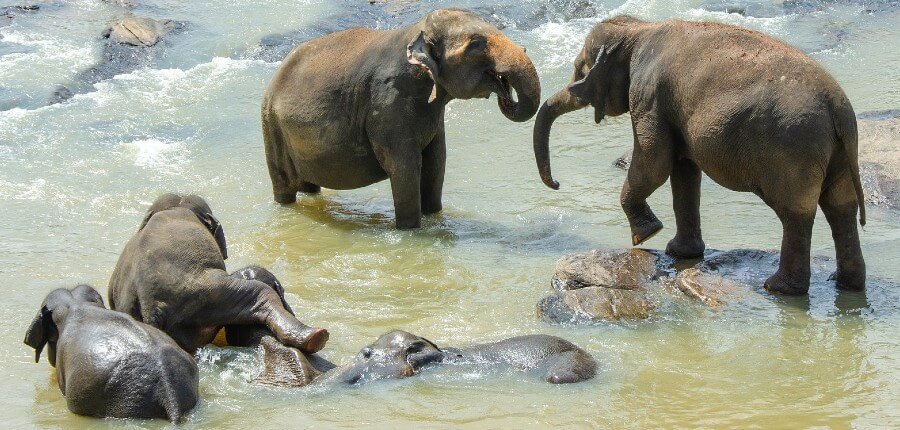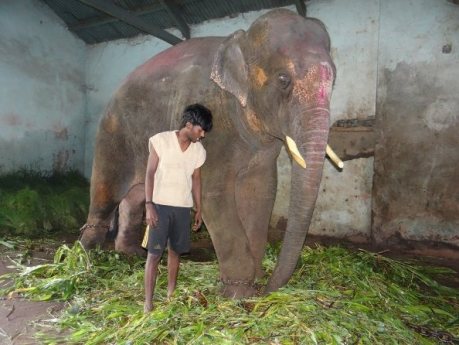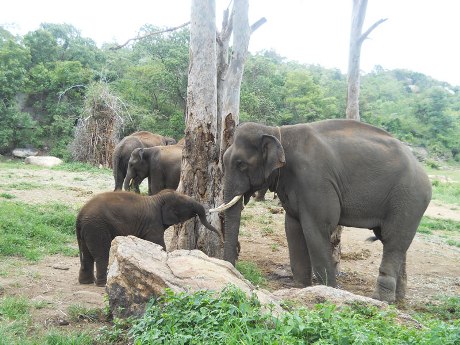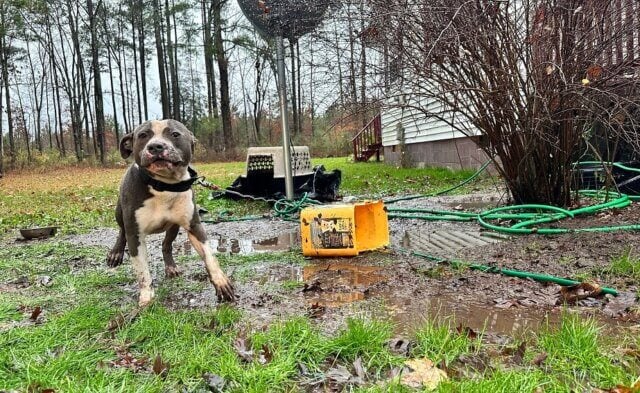In their natural environment, elephants are highly social animals who live in multigenerational matriarchal herds. These tight-knit families work cooperatively to defend one another, search for food, and care for offspring—even receiving help from “babysitters” within the herd. Elephants talk among themselves, make group decisions, and celebrate achievements and momentous occasions.
Elephants also have elaborate mourning rituals, often remaining by their dead companions for days on end. Groups of elephants have been observed stroking and examining the bones of family members, offering condolences to one another, and “burying” the body with twigs and grass. When an elephant was killed by a train in eastern India, 15 elephants returned to the tracks for days on end in what appeared to be a mourning ritual or a distraught effort to avenge the death of their family member.
Elephants often assist ailing family members and attempt to nurse them back to health. One researcher recalled watching as an elephant family frantically tried to revive a group member who had been shot, lifting her up with their tusks, pushing her, and even stuffing food into her mouth.
Experts have also determined that elephants offer consolation to individuals who are in distress. Animal behaviorists observing a herd of elephants found that when one member showed signs of distress, others rushed over, cooing softly and stroking the upset animal.
PETA entities worldwide have helped get numerous elephants removed from miserable circumstances—including all 16 elephants formerly “owned” by the notorious Hawthorn Corporation, which rents animals to circuses—and are working hard in behalf of many others.
PETA Asia is currently campaigning to help free Mali the elephant, who is being held in solitary confinement at the Manila Zoological and Botanical Garden.
Last year, PETA India won its multiyear battle to free a young elephant named Sunder from a temple where he was used as a living begging bowl. He spent almost 24 hours a day immobilized by chains in a dark shed and was severely beaten by his young trainer (or mahout), bearing numerous scars to prove it. Thousands of people around the world took online actions calling for Sunder’s release, and numerous celebrities—including Paul McCartney and Pamela Anderson—spoke out on Sunder’s behalf. PETA India sued for Sunder’s freedom, and the Supreme Court of India ruled in Sunder’s favor—a huge coup.
Through the generosity of the late Sam Simon—one of television’s most successful producers and a PETA benefactor, after whom our Norfolk headquarters is named—Sunder was sent to a lush, tropical wildlife reserve where he has free run of the park’s forests, streams, and ponds. Recently, thanks to PETA India, the park finished putting up 122 acres of solar fencing, and Sunder and his new herd will be able to roam a vast open space. This is a first for India!
Sunder, who knew nothing but loneliness and misery for years, now loves and enjoys bathing and playing with his new family of 13 other elephants.
We’re confident that the day will come when images of elephants in chains are looked upon as a shameful relic of history. Thank you for helping to stop the abuse of these sensitive, majestic animals through your generous support of PETA!
This article was originally published in PETA’s Augustus Club newsletter. PETA’s Augustus Club is a complimentary club honoring those who are leaving a legacy for animals through a planned gift to PETA. If you have made a planned gift to PETA, please let us know so that we can thank you! If you have not yet left a legacy for animals but would like information on how to do so, please contact us.







